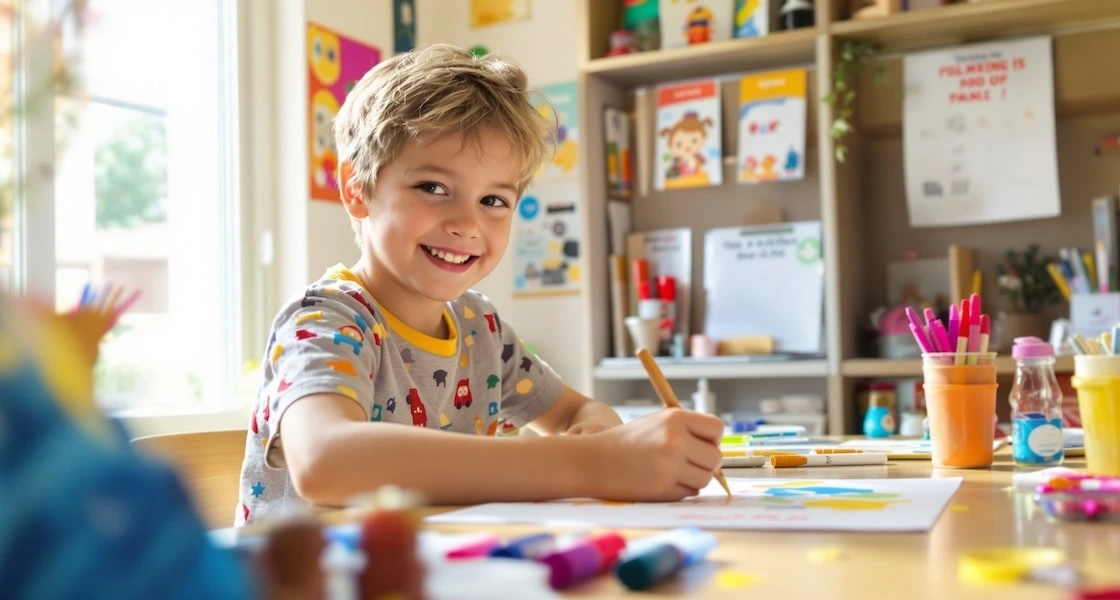Twice exceptional learners, children who are both intellectually gifted and have learning differences such as ADHD, dyslexia, or autism, need an approach to education that recognizes both their strengths and their challenges. Their asynchronous development often means they excel in advanced concepts while needing extra support in areas like executive functioning or basic skills.
Homeschooling provides the flexibility to nurture these unique profiles, allowing parents to design a learning environment where abilities shine and challenges are supported with care. At Outschool, we help families access personalized classes, expert guidance, and communities that make homeschooling a powerful option for twice exceptional learners.
Understanding twice exceptional children: Strengths and struggles
Twice exceptional learners, or "2e" children, are gifted students with learning differences like ADHD or dyslexia. They excel in some areas while struggling in others, creating unique educational needs. Their asynchronous development often leads to significant gaps in skills, making it challenging for parents to understand their child's brilliance alongside their struggles or track their academic progress.
Creating a supportive homeschool environment is crucial for these learners. Homeschooling allows families to tailor education to their child's strengths and challenges, fostering a nurturing atmosphere. Recognizing that a child's brain works differently can shift perspectives, helping parents see learning challenges as part of their unique profile.
How to identify twice exceptional children in homeschool
Spotting twice exceptional traits in your homeschooled child starts with recognizing that you're already perfectly positioned to notice these unique learning patterns. Daily interactions and observations give you potentially missed insights, making early identification possible and empowering.
- Watch for contrasting abilities: Notice when your child demonstrates advanced reasoning or vocabulary but struggles with basic tasks like handwriting, organization, or following multi-step directions.
- Document learning patterns: Keep notes about when your child excels versus when they hit roadblocks; these observations can reveal the asynchronous development typical of twice exceptional learners.
- Connect with parent communities: Join online forums, local homeschool groups, or Outschool Facebook communities where you can share experiences and gather insights from other families navigating similar journeys.
- Gather feedback from multiple sources: Ask tutors, co-op teachers, or activity leaders about your child's performance in different settings to build a complete picture of their strengths and challenges.
- Use informal assessments: Try age-appropriate screening tools or educational games that can highlight giftedness and potential learning differences without the pressure of formal testing.
- Trust your parental instincts: You know your child best. If something feels different about how your child learns compared to their peers, that insight is worth exploring further with learning specialists or educational psychologists who understand twice exceptional profiles.
Recognizing twice exceptional traits in a homeschooled child is less about finding a single “answer” and more about building a fuller picture over time. You can better understand your child's unique profile by combining careful observation, supportive communities, and trusted professional input when needed.
Effective homeschooling strategies for twice exceptional learners
Homeschooling offers twice exceptional (2e) learners a unique opportunity to thrive. Because you can shape the learning environment, you can highlight your child’s strengths, support their challenges, and build a natural routine for your family. With flexibility and creativity, you can design an approach that nurtures their abilities and well-being.
- Strengths-first curriculum: Begin with your child’s talents and passions, then build outward. By weaving in support for more challenging areas through creative, multi-sensory methods, you help learning feel both motivating and achievable.
- Embrace project-based learning: Encourage your child to dive deeply into topics they love. These projects naturally integrate skills they may find challenging.
- Plan regular field trips and community connections: Bring learning to life outside the home. Visits to museums, nature centers, or community homeschool events and programs provide meaningful context and create opportunities for socialization with peers who share similar interests.
- Create adaptable daily rhythms: Create a daily flow that matches your child’s energy. Allow for focused learning when they’re ready, balanced with breaks, movement, and downtime when they need to recharge.
- Schedule monthly reflection sessions: Set aside time to review progress each month. Reflect on what’s working well, where minor adjustments could help, and how your child’s needs may change over time.
- Connect with other families: Connect with other families on a similar path. Sharing ideas with parents and allowing your child to meet peers with similar experiences helps foster belonging and understanding.
Every twice exceptional learner’s path is unique, and homeschooling allows you to embrace that uniqueness fully. By focusing on strengths, building flexibility, and creating supportive connections, you set the stage for growth in skills and confidence.
FIRST MONTH FREE!
Get support that meets kids where they are.
Learn moreHow gifted children with learning differences thrive in homeschooling
Homeschooling creates space for children with advanced abilities and learning challenges to flourish. Its greatest strength is flexibility; you can adjust the pace, structure, and focus to match your child’s unique learning profile. This adaptability helps you nurture their gifts while also supporting their areas of struggle, creating a balanced and positive learning journey.
- Room for depth: Gifted children often crave the chance to dive deeply into subjects that spark their curiosity. Homeschooling allows them to linger in these areas without the pressure to “move on” too quickly.
- Safe space for struggles: When learning challenges surface, homeschooling creates a gentler environment where mistakes are part of the process rather than something to hide. This safety net encourages persistence and resilience.
- Confidence through mastery: Success in areas of strength builds momentum. Over time, these wins help children feel more capable and willing to pursue more advanced academic endeavors
- Stronger identity formation: Homeschooling allows gifted children with learning differences to see themselves as whole learners, not “smart but struggling,” but complex individuals with a unique blend of talents and needs.
- Family-centered support: Learning at home strengthens family bonds. Daily collaboration builds trust, and children feel reassured knowing they are supported by people who know them best.
Every twice exceptional learner’s path is unique, and homeschooling allows you to embrace that uniqueness fully. By focusing on strengths, building flexibility, and creating supportive connections, you set the stage for growth in skills and confidence.
Frequently Asked Questions About Homeschooling Twice Exceptional Kids
As an experienced homeschooling parent, you've likely developed strong instincts about what works for your family, but twice exceptional children can present new questions even for seasoned educators. These frequently asked questions address families' most common concerns when creating supportive learning environments for their 2e children.
How can I find resources and support for 2e homeschooling?
Start by connecting with online communities like the Gifted Homeschoolers Forum, where families share practical strategies and emotional support. Organizations such as Supporting Emotional Needs of the Gifted (SENG) and the National Association for Gifted Children offer research-based guidance for twice exceptional learners.
What are the signs of burnout in twice exceptional children, and how can I prevent it?
Watch for increased anxiety, emotional distress, or signs of nervous system burnout, resistance to previously enjoyed activities, perfectionist paralysis, or sudden drops in motivation. Since twice-exceptional kids often mask their learning difficulties due to their advanced cognitive abilities, they may push themselves beyond their limits without showing obvious distress. Prevent burnout by building regular breaks into your schedule, celebrating effort over perfection, and maintaining open conversations about feelings and frustrations.
How do I balance academic rigor with emotional and social needs for my 2e learner?
Focus on your child's interests and strengths while providing gentle support for challenging areas, rather than forcing grade-level expectations across all subjects. Allow time for processing emotions, social connections, and creative expression alongside academic work. Remember that emotional regulation and social skills are as important as academic achievement for long-term success and happiness.
What socialization opportunities are available for twice exceptional learners in a homeschool environment?
Look for interest-based groups, clubs, and activities where your child can connect with peers who share similar passions, regardless of age differences. Many communities offer homeschool co-ops, 4-H clubs, theater groups, or STEM programs that welcome diverse learners. Online platforms can also provide social connections through virtual clubs, gaming communities, or collaborative projects with other twice exceptional children who understand their unique perspective.
Empower your homeschool journey
Homeschooling your twice exceptional child opens the door to individualized learning that honors their gifts and unique challenges. The flexibility to adjust pace, explore interests in depth, and provide targeted support creates an environment where 2e learners can confidently thrive.
Innovative homeschooling strategies emphasizing curiosity-driven and strengths-based learning can have transformative effects, helping children build confidence and resilience while staying engaged. Outschool offers live classes, self-paced courses, and 1:1 tutoring designed to support twice exceptional learners, giving you tools and community to strengthen your homeschool experience.






.svg)
.svg)







